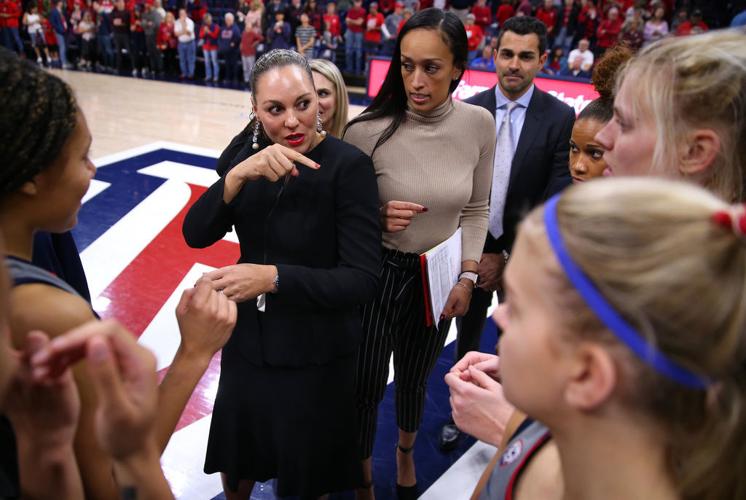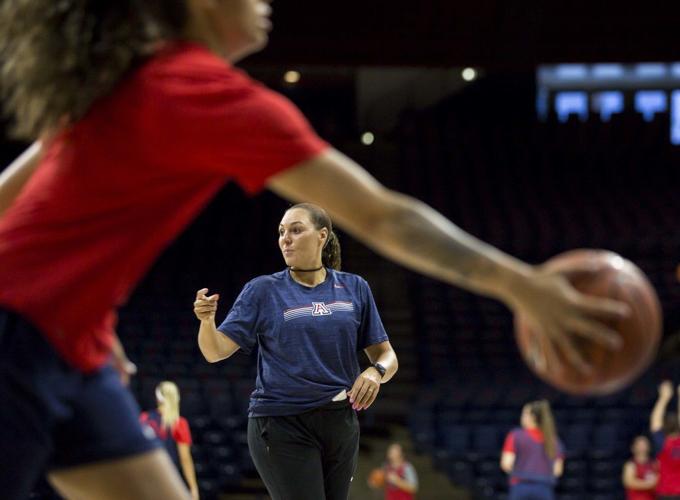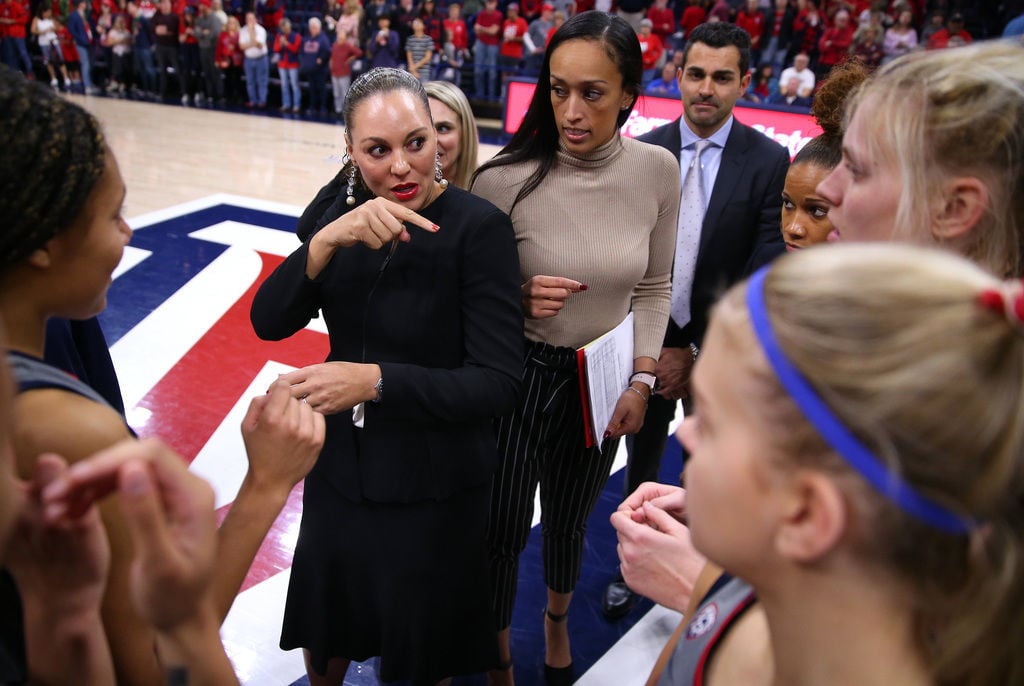Adia Barnes has already earned a $5,000 bonus for winning 23 regular-season games and is to be paid $10,000 if Arizona is included in the NCAA Tournament field next week. You can put that $10K in the bank today.
If you win enough in college sports, financial rewards follow.
Barnes, who is paid $400,000 per season, will be paid another $25,000 if she remains Arizona’s coach through June. And if the Wildcats finish the regular season ranked between 11-15 in the final Associated Press poll — they’re 13th now — she’ll be paid another $5,000.
But here’s one bonus clause that won’t kick in: Barnes will not realize $10,000 for being the Pac-12 Coach of the Year.
That’s because Oregon’s Kelly Graves won the award earlier this week. Not much to question with that. The Ducks didn’t just win the league, they did so in overwhelming style, 17-1 in the Pac-12, routing top 10 teams Stanford by 32, UConn by 18 and, of all things, beating the USA Olympic team.
Graves did more with more. Barnes, whose team finished fourth, did more with less. It was probably a tough call for the 12 coaches who vote for Pac-12 awards, but historically the COY award in Pac-12 women’s basketball goes to the league championship coach.
Here are the COY numbers since the league began competition in 1987:
First-place coach: 24 times;
Second-place coach: four times;
Third-place coach: three times;
Fourth-place coach: Once, awarded to WSU’s Harold Rhodes in 1991 when his team, coming off 2-16, 6-12 and 6-12 conference seasons, finished 10-8.
Fifth-place coach: Once, given to OSU’s Judy Spoelstra in 2000, when her team went 10-8 after 2-16 and 3-15 seasons.
Ninth-place coach: Once, presented to Cal’s Caren Horstmeyer in 2004 when her team endured the January death of junior guard Alisa Lewis from spinal meningitis.
Despite winning the Pac-10 championship in 2004 and playing in seven NCAA tournaments at Arizona, Joan Bonvicini was only voted coach of the year once, in 1998, a Cinderella-type rise from nowhere with Barnes as the league’s top player. The Wildcats finished second behind Stanford that season; Cardinal coach Tara VanDerveer has been COY an astonishing 15 times, including six times between 2008-14. Her team won the league title all six times.
What intrigues me about Pac-12 coach of the year awards — in all sports — is how difficult it is to finish No. 1. And also about how some coaches in other sports vote more for Cinderella stories than, say, continually punching the ticket of a dominant coach like VanDerveer.
Last spring, Arizona’s men’s tennis coach, Clancy Shields, was voted Pac-12 COY. The coaches might’ve chosen UCLA’s Billy Martin, whose team was undefeated in the league. But that’s same-old, same-old territory. Martin had been COY four times in the previous seven years.
Shields’ Wildcats were a modest 2-5 in league tennis matches, finishing in sixth place, were eliminated in the first match of the conference and NCAA tournaments. But his body of work was, in some ways, as impressive as Barnes’ work with Arizona’s women’s basketball program.
Arizona’s men’s tennis team reached the NCAA Tournament last season for the first time in nine years. It plays in the wickedly difficult Pac-12, and fellow coaches clearly knew what it took for Shields to build a competitive team.

Coach Adia Barnes will get $50,000 in bonus pay if Arizona wins two more games, 25 overall, and gets to the Sweet 16. She already earned a $5,000 bonus for winning 23 regular-season games this year.
In 42 years of Pac-12 men’s tennis, the only Arizona coaches voted COY were Ted Kissel in 1981 and Tad Berkowitz in 2009. It might take another 40 years before an Arizona tennis coach is so recognized.
Here’s how difficult it is to be a Pac-12 Coach of the Year:
- Dick Tomey only did so once, in 1992. Somehow, his 12-1 team of 1998 did not lead to COY honors.
- Jerry Kindall was not the COY when his Arizona baseball team won the 1986 national championship, although he was honored in 1980, 1989 and 1992. It didn’t seem like enough, especially since Stanford’s Mark Marquess won it nine times.
- Lute Olson (seven COY awards) is not the career leader at Arizona. That honor is shared by softball’s Mike Candrea and swimming’s Frank Busch, each with 11 Pac-12 COY awards. Olson did not get the 2001 COY award even though he led Arizona to the Final Four and overcame the death of his wife, Bobbi, at midseason. UCLA’s Steve Lavin, whose Bruins finished third, 14-4 in league play, got it.
- UA volleyball coach Dave Rubio has been Pac-12 COY once, in 2000, but his best team was the 2001 Final Four squad, winning the league for the only time, 16-2. He was the national coach of the year in ’01, but not his own conference’s COY.
- Arizona’s deep history as a distance-runners school is reflected by nine COY awards shared by Dave Murray (seven) and James Li (two). Murray was COY in 1983, 1984, 1986, 1987, 1991, 1994 and 1999, which is a step ahead of Olson’s seven over 18 seasons, 1986-2003.
- Winning Pac-12 COY awards has become more and more difficult at Arizona. The school won 15 in the 1980s, 21 in both the 1990s and 2000s and just 12 in the 2010s. How does Sean Miller’s three COY awards compare to others at Arizona? Jim Gault, the UA’s gymnastics coach, was COY five times: 1989, 1990, 1993, 1994 and 1996.
Last spring, UCLA won the NCAA softball championship, tied by Washington atop the Pac-12 with a 20-4 record. Arizona was a thread behind at 19-5. Those three powerhouses went 8-1 against Stanford, outscoring coach Jessica Allister’s team 57-11.
Yet it was Allister, whose team finished in fifth place, 12 games behind the Huskies and Bruins, who was named Pac-12 Coach of the Year. Why? It was the Cinderella factor. Stanford had not produced a winning record for six years.
Barnes, who is Cinderella times two, didn’t receive a trophy. But she will get $50,000 in bonus pay if Arizona wins two more games, 25 overall, and gets to the Sweet 16.
That should be enough to make you forget the league even gives a coach of the year award.






